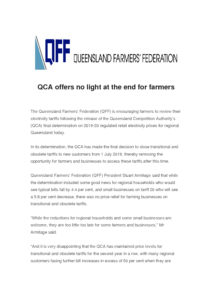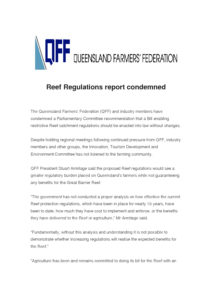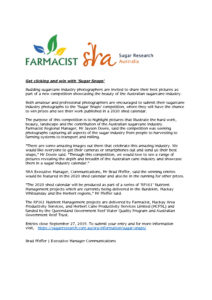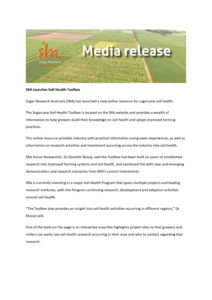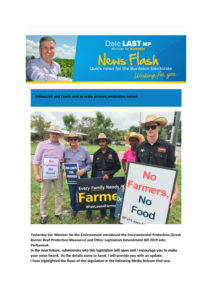Category: Media Releases
Media
QUEENSLAND APPOINTS FIRST WORK HEALTH SAFETY PROSECUTOR
Queensland appoints first Work Health Safety Prosecutor
The Government has announced the appointment of Aaron Guilfoyle as Queensland’s first independent Work Health and Safety Prosecutor.
Industrial Relations Minister Grace Grace said Mr Guilfoyle would lead a new independent statutory office focused on workplace health and safety and electrical safety prosecutions.
“Mr Guilfoyle as the former Assistant Director for the Commonwealth Director of Public Prosecutions (CDPP) has extensive experience in high-profile and complex regulatory prosecutions,” Ms Grace said.
“He is eminently qualified to become Queensland’s first Work Health and Safety Prosecutor and to provide expert workplace health and safety legal advice to government.”
Ms Grace said the new statutory office and the appointment of a Work Health and Safety Prosecutor delivered on a key recommendation of a best practice review of Workplace Health and Safety Queensland.
“The best practice review followed the Dreamworld tragedy and two workplace deaths in 2016 at Eagle Farm racecourse, which shocked and saddened us all,” Ms Grace said.
“We’ve put in place a stronger framework to deliver an independent and robust workplace prosecution system that Queenslanders can have confidence in.
“The appointment of Mr Guilfoyle coincides with tougher, best practice safety requirements for Queensland amusement rides and theme parks from May.”
Mr Guilfoyle has been appointed to a five-year term.
Further information
For more information on the Best practice review of Workplace Health and Safety Queensland, visit worksafe.qld.gov.au
QFF – Reef Regulations Condemned
SRA Media Release – Sugar Snaps
Farmers silenced in Reef Regulations consultation – QFF
Farmers silenced in Reef regulations ‘consultation’
The Queensland Farmers’ Federation (QFF) has questioned the Queensland Government’s ability to represent all Queenslanders after it cancelled public hearings on the new reef catchment regulations in the regions the legislation will impact.
Despite being silenced in the consultation process, the Environmental Protection (Great Barrier Reef Protection Measures) and Other Legislation Amendment Bill 2019 will see a greater regulatory burden placed on Queensland’s farmers while not guaranteeing any benefits for the Great Barrier Reef.
QFF President Stuart Armitage said farmers in the reef catchments affected by these changes had a right to be heard and the Queensland Government had a duty to listen.
“The Innovation, Tourism Development and Environment Committee will only hold one public hearing in Brisbane next week, but this Bill applies to people in coastal regions almost the entire length of the state,” Mr Armitage said.
“QFF acknowledges the Office of the Great Barrier Reef undertook an extended consultation process through the Agricultural Stakeholder Advisory Group, but some of the more concerning elements of the proposed regulations were included after this process.”
“Moreover, the issues raised by agricultural stakeholders have not been reflected in the Bill, so many have seen this process as a ‘presentation exercise’ rather than a consultation process.”
“Clearly, the Committee would benefit from regional hearings to engage directly with those people the proposed regulations will affect.”
Mr Armitage said the situation brought into question whether the basic mechanics of our Parliamentary process were fit for purpose.
“The committees are our ‘house of review’. They must be able to genuinely review legislation and put forward informed recommendations to improve law making in the interests of all Queenslanders,” Mr Armitage said.
ENDS
Media Contact:
Kayla Plunkett – 0448 000 692
ONLINE QFF STATEMENT
QFF Welcomes funding for Reef projects
QFF welcomes funding for Reef projects
The Queensland Farmers’ Federation (QFF) will partner with the Great Barrier Reef Foundation to deliver two new water quality projects that will support the efforts of farmers and others working with the agricultural sector to safeguard the future of the Reef.
The Reef Alliance Phase Two Project will see industry and NRM groups work with farmers to improve their land management practices. While the Early Career Extension Project will place up to 8 emerging extension officers with organisations that provide agricultural advisory services across the reef catchments to build professional capacity.
QFF President Stuart Armitage, on behalf of all delivery partners across the two projects, welcomed the Foundation’s investment in farmers and agricultural extension officers and their work to improve the quality of water entering Great Barrier Reef.
“Over the next year, Reef Alliance members Burnett Mary Regional Group, CANEGROWERS, Fitzroy Basin Association, NQ Dry Tropics and Terrain NRM, will work with farmers to adopt best management practices that will minimise runoff from farms,” Mr Armitage said.
“Skilled extension professionals will assist farmers increase their uptake of adaptive farm management practices to reduce soil loss, fertiliser application and pesticide runoff.”
“These important environmental stewardship actions will make improvements to the quality of the water leaving the farm and significantly contribute to the health of the Great Barrier Reef.”
“QFF looks forward to working constructively with the Great Barrier Reef Foundation, members of the Reef Alliance and the local community to deliver outcomes to improve water quality for the Reef.”
The Reef Alliance Phase Two Project and the Early Career extension officers Project are funded by the partnership between the Australian Government’s Reef Trust and the Great Barrier Reef Foundation.
ENDS
Media Contact:
Kayla Plunkett – 0448 000 692
ONLINE QFF STATEMENT
SRA Media Release
SRA Media Release – Adoption Group
SRA welcomes Mr Matt Schembri and Mr Peter Verwey to Adoption Group
SRA has appointed new staff to its Adoption Group, marking another step forward in the delivery of the industry-led Adoption Strategy.
Mr Matt Schembri and Mr Peter Verwey have joined SRA as Adoption Officers, working in the Central and Burdekin regions respectively.
SRA Executive Manager, Regional Delivery, Mr Ian McBean, said that Matt and Peter would work closely with SRA adoption and research staff, growers, millers, and other service providers to help industry improve productivity, profitability and sustainability. The Adoption Group provides a vital conduit between research and growers and millers, assisting industry to adopt practices and technology that improve their bottom line.
Matt Schembri comes to the role from recent work with Natural Resource Management (NRM) organisations in Central Queensland, working with farmers and graziers on Best Management Practice (BMP) programs and practice change. He is a former Research Engineer with the Sugar Research Institute and also has 10 years of experience growing sugarcane.
Peter Verwey comes to the role from work within agriculture in the Murray-Darling Basin, in particular working with farmers on irrigation infrastructure system upgrades. He is experienced in agricultural extension through BMP programs such as the cotton industry’s myBMP. He has also worked in North and Central Queensland in previous roles.
“Matt and Peter offer valuable skills and knowledge for the Australian sugarcane industry,” Mr McBean said. “They are looking forward to working with the local industry in their regions and delivering outcomes for growers and millers.”
Mr McBean added that SRA was well-advanced in delivering the industry-wide strategy for adoption services.
“Our SRA Regional Coordinators have established regional adoption advisory committees in each of the six regions to formulate and discuss local priorities. We are also soon to have our first meeting of the Industry Adoption Advisory Committee. Through this industry consultation, we will resource adoption activities that best fit the requirements of the region.”
Media Release – Indonesian Trade Deal
Indonesia deal a boost for Queensland agriculture
Queensland is in a prime position to capitalise on the signing of an Australia-Indonesia Free Trade Agreement.
Minister for Agricultural Industry Development and Fisheries Mark Furner welcomed today’s signing of the agreement, saying it will be a boon for exporters of Queensland agricultural products.
“By 2030, Indonesia is expected to be in the top five economies in the world, and its population of 270 million makes it one of our most promising export markets,” Mr Furner said.
“In 2017 Australia exported around $3.5 billion worth of agricultural goods to Indonesia. With this new Free Trade Agreement in place we would expect to see that total increase significantly.
“Our efforts to capitalise on those opportunities will mean more jobs in a stronger Queensland economy.”
Mr Furner said Queensland would be particularly advantaged by increased exports of live cattle, frozen beef and sheepmeat, sugar and dairy products.
“Under this Agreement, by 2020 almost everything we export to Indonesia will be either duty free or under improved preferential arrangements,” Mr Furner said.
“Indonesia will guarantee automatic issue of import permits for key products such as live cattle, frozen beef, sheep meat, feed grains, citrus products, carrots and potatoes.
“It will also benefit our grain growers, with Indonesia agreeing to import 500,000 tonnes of grain tariff free.”
Key FTA outcomes:
Live cattle: Duty free access for 575,000 head of live male cattle per year, growing at 4% per year to 700,000. A review mechanism in year 6 will consider subsequent increases.
Frozen beef and sheepmeat: Remaining tariffs on all Australian exports of frozen beef and sheepmeat into Indonesia reduced to 2.5% immediately and eliminated after 5 years.
Feed grains: Duty free access for 500,000 tonnes of feed grains per year (wheat, barley, sorghum), increasing at 5% per year.
Sugar: Cut the tariff on Australian sugar to 5% (from 8-12%).
Dairy: Eliminate 5% tariff for milk and cream, concentrated or containing added sugar or other sweetening matter. Elimination of 5% tariff for grated or powdered cheese.
Citrus:
Mandarins – Tariff cut to 10% (from 25%) for 7,500 tonnes per year; tariff further reduced over time, down to 0% after 20 years for an unlimited volume
Oranges – duty free access for 10,000 tonnes of oranges per year, increasing 5% each year
Lemons and limes – duty free access for 5,000 tonnes of lemons and limes per year, increasing 2.5% each year.
Potatoes: Tariff cut to 10% (from 25%) for 10,000 tonnes per year; after five years tariff further reduced to 5% for 12,500 tonnes per year, increasing by 2.5% per year.
Carrots: Tariff cut to 10% (from 25%) for 5,000 tonnes per year; tariff further reduced over time, down to 0% after 15 years for an unlimited volume.
Honey: Eliminate 5% tariff on Australian honey after 15 years.
